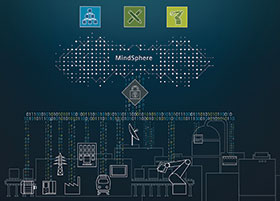

Actively shaping change
No industrial company in the world, no matter its size, will be able to sidestep this issue. Siemens is expanding its portfolio for digital enterprises step by step, supporting customers in the manufacturing and process industries with digitalisation, customisation and efficiency improvements.
How does Siemens help its customers prepare for digitalisation?
From our leading position in automation, we’re driving the digitalisation of our business and of the industry as a whole. With our software portfolio, we’re the only producer to offer the digital twin along the entire value chain – for products, for production and for entire systems. We also support new production methods with innovative solutions for handling systems, robot integration, and the establishment of an open and global digital marketplace for additive manufacturing.
What products and solutions are involved?
Our digital enterprise offering consists of four elements: industrial software, communication, security and services. Depending on their needs, our customers can gradually get started with one of these four core elements of the digitalisation process at any point in their value chains. And that’s true for companies of any size.
Siemens has been continuously improving its Digital Enterprise portfolio. Where do things stand now?
The main themes now are simulation, new production methods and processes, and data-based services. Let me explain using Bausch + Ströbel, a mechanical engineering company that is presenting at our booth here in Hanover. Bausch + Ströbel designs, produces and sells packaging and production systems for the pharmaceuticals industry worldwide. To implement customer requests more quickly, it relies on significant improvements in efficiency using digital twins of its machines. Digital twins allow virtual commissioning that enables reliable detection and elimination of errors, considerably shortening the processes of engineering and real commissioning. Bausch + Ströbel expects an efficiency increase of 30 percent by 2020 and is working with us to achieve this goal. And digital twins live on after their real counterparts have been built and delivered. Insights and data from operation by the customer flow back to Bausch + Ströbel, which always has a current virtual copy of the machine in-house – ideal for service and a real competitive advantage.
Everybody’s talking about MindSphere. What’s behind that?
Working hand in hand with our partners and industrial customers, we are continuing to drive forward the expansion of MindSphere as a platform as a service, creating an ever more extensive eco system.
MindSphere is our cloud-based, open operating system for the Internet of Things. With it we’ve established the foundation for data-based industrial services. With MindSphere, our customers can gather data very efficiently and quickly – about a production facility, for example. By continuously recording and analysing machine or system parameters, such as operating temperature, fluid levels or speeds, and making them available online worldwide, we can improve system performance and organise predictive maintenance. We’re constantly working with our industrial customers and our partners to expand MindSphere as a platform as a service and also to broaden its ecosystem.
How is digitalisation affecting training and jobs?
Digitalisation is radically changing the way we work. Mechanics or electricians, for instance, will no longer get by in their jobs without thorough knowledge of software in the future. Not only do they have to use the technology, they also have to be able to improve on it. That calls for lifelong learning. Companies have to organise professional development and adjust their methods in such a way that they are also suitable for older employees. That’s why we invest so much in the professional development of our staff at Siemens. We spent 270 million euros on that in fiscal year 2016.
For more information contact Jennifer Naidoo, Siemens Digital Factory and Process Industries and Drives, +27 (0)11 652 2795, [email protected], www.siemens.co.za
| Tel: | +27 11 652 2000 |
| Email: | [email protected] |
| www: | www.siemens.co.za |
| Articles: | More information and articles about Siemens South Africa |

© Technews Publishing (Pty) Ltd | All Rights Reserved